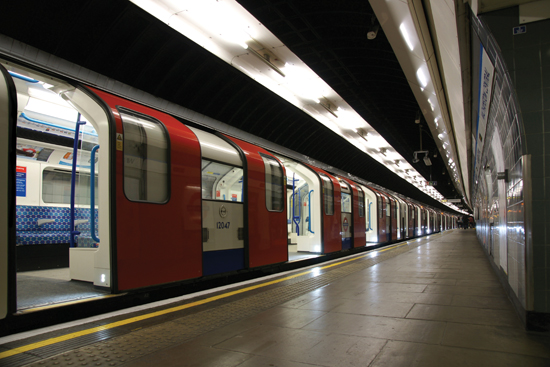

Since last year, passengers on the London Underground have been able to browse the web and check emails thanks to the introduction of Wi-Fi at around 100 stations on the network, but a new report says they should receive mobile phone coverage too.
Calling All Stations, launched last month by London Assembly Member Gareth Bacon, questions why the Tube continues to have no coverage when the technology is clearly there.
The Tube Wi-Fi service has proved popular, with more than one million people using it since its introduction, but connectivity remains limited to the stations and not tunnels, while it is still not possible to make phone calls or send texts.
Of the ten largest underground networks in the world, the tube is the only one without at least some form of mobile phone connectivity on some underground platforms. Even the UK’s other two systems, the Glasgow Subway and Tyne and Wear Metro, have mobile connectivity, although these are much smaller networks with fewer tunnels.
Commuters are not able to facilitate business on the move and without mobile phone coverage, it argues, London risks being left behind by other cities and missing out on a range of benefits for both the city and its transport network.
Tube mobile phone coverage would allow passengers to share information on incidents, delays and line closures and allow them to avoid passenger bottlenecks by re-routing their journey while on the go.
This is, of course, possible on the platform using the tube Wi-Fi service, but not in tunnels and not on older, incompatible mobile phones.
TfL maintains that the Wi-Fi network is adequate for passengers’ needs and that it has proved “immensely popular”. However, the service is only available to Virgin Media, Vodafone and EE customers without incurring additional charges.
It told TechWeekEurope that although it supported the idea of mobile rollout on the Tube “in principle”, any project should not come at the expense of taxpayers or fare payers and that major UK phone operators had so far been unable to come up with a self-financing solution for voice calls in the deep tube.
It adds that businesses do not consider tube mobile phone coverage to be a priority and that its current upgrade plans for the London Underground and the capital’s road network are far more important
“It is this investment that will maintain London’s position as the engine of the UK economy,” TfL claimed.
Technical excuses such as the tube is too old and its tunnels too narrow to accommodate the necessary technology are seen as false because some of the newer lines are the same age as the Paris Metro, while some of the subsurface lines (Circle, District, Metropolitan, and Hammersmith & City) are close to the standardised train and tunnel sizes of the Berlin U-Bahn. The report says that this means mobile phone coverage is possible on at least some of the network.
It is also unconvinced that the costs of such a project would be prohibitive, arguing that TfL could provide the Tube with voice, SMS and 4G data with minimised delay and at low cost to Londoners. The most recent estimate of installing 3G coverage was £100 million, of which £50 million would have been provided by Chinese manufacturer Huawei.
TfL could also follow the examples of Paris and Rome where a number of operators clubbed together to fund the installation of the infrastructure, or the Channel Tunnel, where three French carriers worked with Alcatel Lucent. Exclusivity to one operator could also be offered in exchange for installation, although the report says that this would create a monopoly.
“TfL has been dragging their feet for too long and London is far behind in terms of mobile connectivity because of this,” said Bacon. “The technology exists and TfL needs to make the kind of progress driven deals other world cities have made.
“It’s time for the Tube to join the rest of the world and get mobile phone coverage.”
Are you fluent in the language of the Internet? Find out with our quiz!
Deliveries of Telsa's 'bulletproof' Cybertruck are reportedly on hold, amid user complaints side trims are…
New feature reportedly being developed by Apple for iOS 19, that will allow AirPods to…
Binance BNB token rises after WSJ report the Trump family is in talks to secure…
After failed Amazon deal, iRobot warns there is “substantial doubt about the Company's ability to…
Community Notes testing across Facebook, Instagram and Threads to begin next week in US, using…
View Comments
It’s time for the Tube to join the rest of the world and get mobile phone coverage. Paris and Berlin have had this technology since the late 1990s and now cities such as Moscow, Rome, Seoul, and Beijing are able to make phone calls, text, and surf the web underground, when we can’t!!!
Thanks for the opportunity. Now enjoy everywhere in the London Underground.
@ Steve,
So far I know that London Underground is pushing ahead with plans to set up a wi-fi internet network at 120 Tube stations. What you think about security?
Nobody wants this. The tube is no place for mobile phone conversations - it's just too packed to do so without causing a great deal of annoyance. Also, people fiddling with their phones texting whilst walking round the station slows down the flow of people and causes congestion on the platforms.